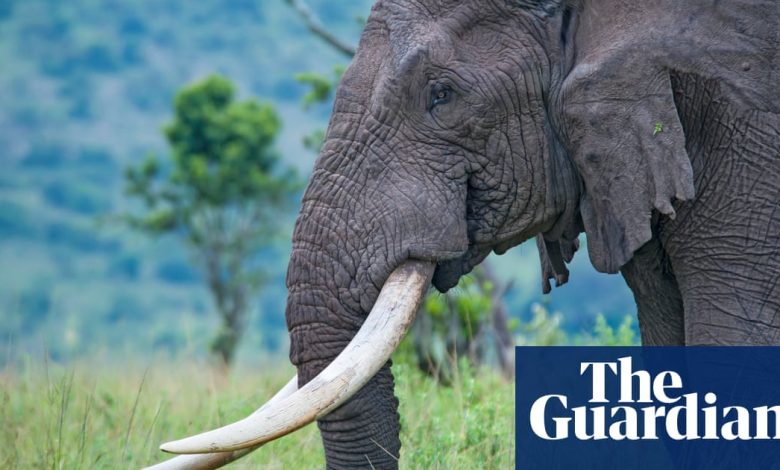Saving ‘old and wise’ animals vital for species’ survival, say scientists | Conservation

iit’s not just people who get wiser as they age—animals do too, according to a growing body of research. The great buffalo fish can reach 127 years Greenland shark 392and some fungi can live 10,000 years or more. And age isn’t just a number: As animals get older, they behave differently based on their life experiences, gain richer knowledge of their environment, and often pass it on to younger members of their group, the researchers say.
The problem is that we are killing these older creatures. “Old Earth animals are in decline,” warned researchers in a paper published in Science last month, which analyzed more than 9,000 peer-reviewed articles. Few animals make it to old age, and those that do are vulnerable to hunting or gathering by humans because they are the largest or have, for example, the largest horns, antlers, or tusks.
The elimination of the largest and most experienced animals can have significant consequences for group culture and social structures, researchers warnas they argue for a new approach called ‘longevity conservation’.
Much research on aging has focused on the negative aspects of health, says lead researcher Keller Kopf, an ecologist at Charles Darwin University in Australia. “This simplistic idea that old individuals are not important to the population or the environment is really not the whole story,” he says. The more he studied different groups of animals, the more he came across remarkable cases demonstrating the value of older creatures. “No matter where we looked, there were good examples,” he says.
Primates, whales, elephants and pack hunters have old individuals that carry vital cultural knowledge and maintain social structures, according to the paper. Older female elephants, for example, have a “social memory” who is friend or foe and are more attuned to potential dangers, such as listening for lions. Orcas are postmenopausal best at finding salmon feeding grounds.
The research shows that removing older individuals causes populations to become increasingly unstable over time, sometimes eventually collapsing.
Older birds can provide better food and care for their offspring, and deep-sea corals, which can grow to be thousands of years old, can provide important shelter for marine mammals. Although older mammals may produce fewer offspring themselves, they help their offspring produce and care for the young. This is called the “grandmother hypothesis” for healthy populations, which was first studied in humans but has also been studied in elephants and killer whales.
Callum Brown, a fish biologist at Macquarie University in Sydney who was not involved in the latest study, says killing off older members of a species is likely to be a big problem for fisheries management. Catching a big fish decreases the collective memory of the population. “The key thing here is that many important behaviors such as migration to spawning grounds and feeding are socially transmitted in many species of fish,” says Brown.
“Imagine a fish swimming in the ocean. The chances of accidentally finding the best feeding or breeding spots are almost nil. That’s why following successful strategies passed down through the generations is so important,” says Brown.
In general, as mammalian mothers age, their reproductive output declines, but this is not the case for fish and reptiles—the number of offspring per fish increases with age, and those offspring may also have a better chance of survival.
“Older individuals likely hold important cultural knowledge, so if our fishing practices are directed at capturing these individuals, then the culture collapses,” says Kopf. “The problem is that once the culture is lost, it’s very difficult to recover.” That would explain, he adds, why many fish populations have not recovered, even after fishing moratoriums.
Kopf’s paper refers to the importance of “cultural transmission,” which not only recognizes that animals have culture, but that these individuals transmit their social learning to other individuals. Older people tend to have accumulated the most knowledge, such as how to find water during dry periods, find safe places to shelter, and find new foods during times of scarcity.
More broadly, there is a growing awareness among conservation practitioners that we need to pay much more attention to social learning and culture in animals—and how these are accumulated in individual creatures. “A term that has definitely been used almost exclusively for humans in the past is ‘wisdom’ and we used that term – wise – in the title [of the study],” Kopf says.
The loss of old individuals can be a driving factor for many species at risk of extinction, he continues. “He is currently unrecognized [by the International Union for Conservation of Nature] but the literature itself indicates that the loss of these old individuals may be a major contributor to the decline of these species. Older elephants, for example, have important functions in social groups, but are systematically hunted for their trophy status and larger tusks.
Kopf and his co-authors call for “longevity preservation” — which would mean targeted policies to protect the elderly. The authors state: “Ancient animals play a vital role in maintaining biodiversity and ecosystem services and therefore … require special policy directives, political motivation and careful management.”
On a more personal level, discovering the importance of older animals made Kopf think more about our own species. “It made me think a lot more about how we don’t value older people in our society. Many elderly people are forgotten,” he says. This is a loss not only for the old people themselves, but also for the entire human society, he says. “What does this do for the modern world?”

